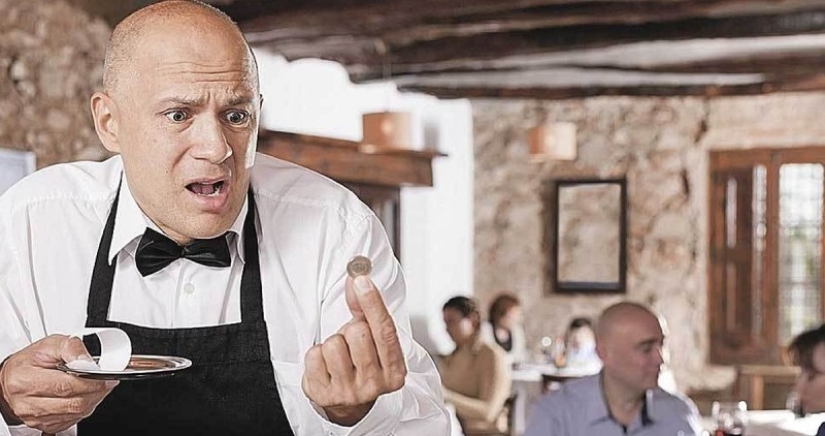Where did the tradition of leaving tips come from and why do we misunderstand it
Categories: World
By Pictolic https://pictolic.com/article/where-did-the-tradition-of-leaving-tips-come-from-and-why-do-we-misunderstand-it.htmlWe know that waiters are left "for tea" and follow this custom both at home and abroad. At the same time, few people know the origins of this tradition and even fewer people understand how, how much and to whom you can give. Let's figure out this difficult question and finally find out all the subtleties of tipping.

The tradition of leaving "for tea" originated in England in the 16th century. At this time, the inhabitants of foggy Albion were partaking of tea and hence the international name of the custom. But strangely enough, its meaning was originally somewhat different. In taverns and pubs then they paid strictly according to the bill, but it was customary to show generosity at a party.

In medieval England, they often stayed overnight. After drinking tea or drinking stronger and no less traditional drinks, it was imprudent to go on horseback or in a carriage at night. Times were harsh and gangs of thugs were operating on the roads.
Therefore, a good host always had rooms ready for those who were late. But in those days, distinguished guests rarely did without servants. If a visitor arrived without a servant, then he was entrusted to the care of the host. For this, before leaving, footmen, maids and even grooms were paid for their work. It could be said that it was a salary paid by a guest.
Nowadays, tips are left to service personnel in catering establishments – in cafes, restaurants and bars. Someone habitually parts with a small amount, and someone can not understand why he should pay extra. An actual tip is a simple and pleasant way to express gratitude to the waiter.
Often, the waiter does not even need to try. The guest gives a small amount simply because the dish is delicious, the place is clean and beautiful, pleasant music is playing, and the staff is friendly. Such is a compliment to an institution that falls into the hands of one of its employees.

The English word tips - tips, does not have an exact interpretation. Some argue that this is an abbreviation. In this case, TIPS is "to insure prompt service" ("to ensure the speed of service"). Supporters of this version say that when the tradition came to the restaurant business, they put boxes in the taverns.
At the entrance to the establishment, the guest defiantly threw a coin into the slot and its ringing immediately attracted the attention of the staff. Those who threw money into the box could count on the fastest and highest quality service. Simply put, he interested the waiter and thereby received improved service.
Another version is no less plausible. It says that the name came from the British criminal jargon of the 16th and 17th centuries. Then "to tip" then meant "to share, to give a share to someone." In the 18th century, this word already appeared in literary English and then spread around the world.
You will be surprised, but psychologists and economists consider tipping a phenomenon and conduct serious research on this. Why does the person paying the bill have to pay something else? After all, the law does not oblige him to do this, does it? Moreover, it is not profitable, because it leads to additional costs.

British psychology professor Richard Lynn names several reasons. The most important of them is the desire to comply with the rules of society. "For tea", according to Lynn, is given in order to avoid condemnation from other people. The second place among the reasons is the motivation of the staff and the third is gratitude for good service.
Of course, there have always been people for whom tipping was a way to show their status. These people are known for leaving "for tea" where it is not customary to do so. For example, in beauty salons, car services and even veterinary clinics. Basically, this is a "disease" of our people, who can easily be recognized in any country of the world due to this habit.
For the recipient, a tip is a good additional income, which sometimes even exceeds the main one. The state does not benefit from this tradition at all. Money settles uncontrollably in the pockets of citizens and no one pays taxes from them. In addition, some condemn the custom, believing that waiters receive unreasonably high incomes.
And this tradition is good for the employer. It allows you to reduce the salary of employees and, very often, make dishes from the menu cheaper. True, there is often a blatant injustice in tips. Because of them, waiters often earn more than chefs.

There are restaurants where tips are included in the bill as a separate item. Usually they do not exceed 20 percent of the order amount. If the amount is more, then there is a chance to scare the client and possibly lose him. Although such institutions are still less in demand than those where money is given on their own initiative.
Fixed tips can only afford elite restaurants where wealthy people go. Sometimes in such places, payment for the service is simply included in the cost of meals. Of course, this makes food and drinks more expensive, but for a rich person this difference will be unnoticeable.
In some prestigious restaurants today they are trying to get away from tipping at all. For example, in the New York institution "Union Square Hospitality Group", where they believe that kitchen and hall workers should have equal rights to encourage their work. At first, visitors were perplexed, but now they perceive this practice normally. Someone even likes the opportunity not to give a "tip" and not be shy about it.
Although the tradition of tipping originated in England, it has gone its own way in different countries. Customers are especially distinguished by the amounts left to the waiters. Contrary to the opinion about the generosity of Russians, the Americans leave the biggest tips. Our fellow citizens, having lived in the USA, even begin to pay extra for the service more willingly and more at home.

In Japan, tips are not left at all. Many waiters don't even understand this phenomenon. If you leave money on the table when leaving the restaurant, then they may catch up with you to return it. There is a high probability that the employees of the institution will decide that you just forgot them. In some cases, money can even offend the waiter. He can understand it as "I'm being paid extra to finally start working well."
In the USA, tips are mandatory and their size is the largest in the world. Americans leave 15-25 percent of the order amount to the staff. The most stingy are the Scandinavians. For example, in Sweden it is customary to give 5 percent. We give 10 percent, but they can give more. Also, 10 percent goes to waiters in Brazil and in most countries of South and Central America.
It would be nice to know the situations when you can not tip at all. Here are 4 cases when you don't necessarily need to encourage someone with extra money.
Recent articles

The calendar says that summer is coming soon. And with it-vacation, sea, cocktails and all that. But the closer the arrival of the ...

Scientists at the University of Birmingham have proven that music is a great helper in increasing productivity and concentration, ...

First, it is beautiful. Secondly, it is really fascinating. These sifco just cut different objects, but looking at these, you may ...